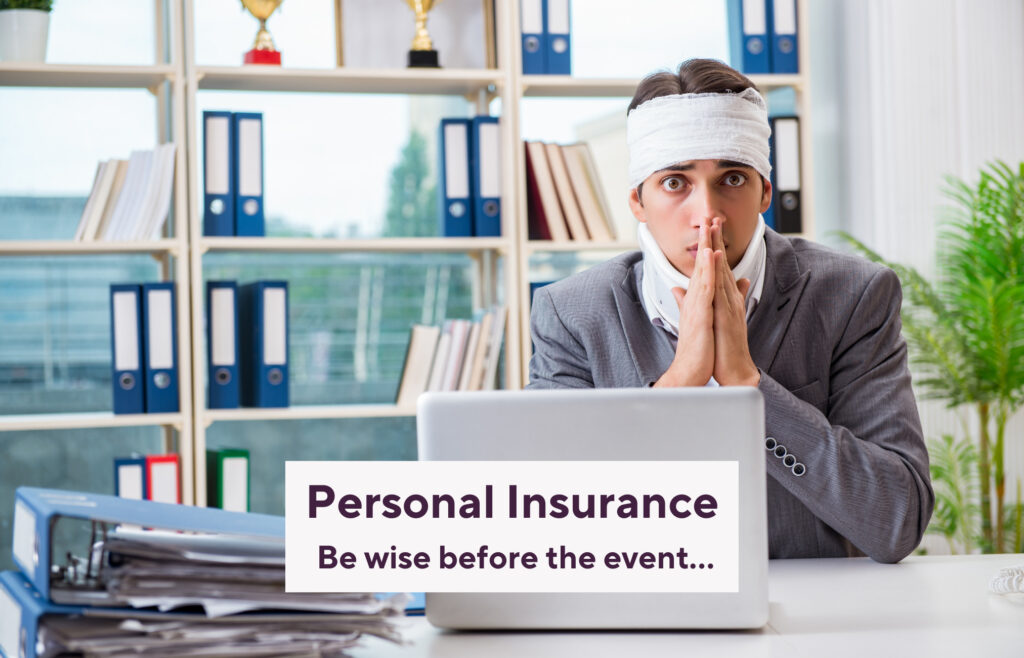4 Types of Personal Insurance That Are Worth Considering

It’s easy to be wise after the event. Taking out certain types of personal insurance is being wise before the event!
What happens if you’re in a bad accident and need to take an extended period off work to recover? Or you were left permanently disabled – or worse? What would happen if you got sick and needed around-the-clock care for a few months?
The more you have, the more there is to lose.
But there‘s a whole suite of personal insurance products available today to protect what you have. And, while wedding insurance (yes, it exists) might not be top of your list, there are a few types of insurance you might want to consider.
Each of the following will provide important protection and peace of mind for you and your family, in the event of an accident, a disaster, or simply bad luck.
1. Life insurance
Life insurance is about protecting your family, should the worst happen to you.
Life insurance policies pay a tax-free lump sum or annuity to those you nominate as the beneficiaries, if you pass away. This helps loved ones maintain their standard of living and ensure they can cover their debts in the event of your death.
In addition to helping to cover the funeral costs, a life insurance pay out should cover the mortgage or rent, provide a source of income for a spouse or partner you leave behind, and cover other assorted expenses that arise.
You may even be able to arrange a pension through your life insurance – this is worth considering if your self-funded retirement plans are not on track.
2. Long-term disability insurance
Say you have an accident and are rendered disabled temporarily or permanently. It’s not just the costs of care you need to think about – it’s also the potential loss of income and if you’re a business owner, the loss of income from a business that depends on you being there.
Disability insurance covers you with a monthly payment to compensate for part of the lost income during the period of disability.
While it’s primarily designed for employees, business owners may also claim it – but you may need to provide tax returns or profit and loss statements that demonstrate expected income.
You can also look at business overhead expense (BOE) disability insurance, which covers all business expenses if you become disabled. This includes rent, utilities, salaries, payroll taxes, accounting fees, etc.
It means one less thing to worry about in the event of a bad accident or serious injury.
3. Critical illness (‘trauma’) insurance
Another supplement to health insurance is critical illness (or ‘trauma’) insurance.
This covers you with a lump-sum payment should you be diagnosed with a serious health condition such as cancer, stroke, heart condition etc. However, depending on the provider, ‘critical illness’ has different definitions and you usually need to survive your condition for 15-30 days before a payment will be made.
This insurance goes over and above the costs of medical care, which your health insurance covers (another type of insurance well worth considering!). Critical illness insurance provides useful funds for other expenses incurred during the period of illness or recovery, including the possibility of funding the lost income if your spouse has to stop work to care for you.
4. Key Person Insurance
For business owners, what would happen to your business if a key employee, partner or director suffered a major illness, injury or death? Could your business sustain the sudden loss of a key technical employee or a star salesperson? How much disruption and cost would be incurred?
If there is anyone in your business whose know-how or overall contribution is uniquely valuable and it would be difficult and time-consuming to replace them, you should consider Key Person Insurance.
This is insurance on the life or health of any employee where the policy can offset the costs (for example, hiring a temporary replacement or recruiting a permanent successor) and losses (such as decreased business performance until successors are trained), which the business may experience when a key person suddenly departs.
Like many insurances, the cost of a Key Person Insurance policy is insignificant compared with the potentially business-threatening disruption that losing a key person incurs.
Be wise before the event…
It only takes one serious event to knock you back financially in life. Your savings can be left looking paltry against serious medical bills or unexpected support costs.
Whatever stage in life you’re at, it makes sense to take precautions for your own peace of mind now and in the future.
While most people consider the common personal insurances (like comprehensive car insurance or home and contents insurance) to be ‘must haves’, the more optional ‘nice to have’ nature of the above insurances means that many people fail to protect themselves in these areas.
You can purchase these insurances as separate policies and some providers bundle policies together and provide discounts.
The options above are not exhaustive but they should help you narrow down your priorities. Just remember – you still need to read the fine print before signing up! We know it can be a little baffling with so many providers, so many options, and so much fine print, but just get in touch with us and we’ll be happy to help you with these important insurances.





